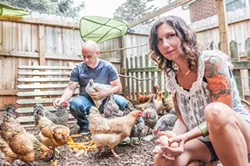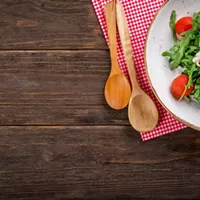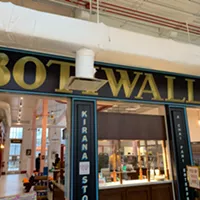Urban chicken movement
One writer's quest to own hens in her Villa Heights backyard
By Keia MastrianniLately, I've been researching things like "sex links," "Buff Orpingtons," "hackles," "wattles" and "combs." It's not as kinky as it sounds, honest. I'm on a poultry quest, people. You know, backyard chickens, free-range eggs — consider me a real-life hipster pioneer.
Since moving to North Carolina three years ago, I have taken a deep interest in the local food movement, particularly my connectivity to what I eat. I want to know where my food comes from. The gateway drug to this obsession began with an organic garden and weekly farmers market visits. Things got serious when my landlady approved my Villa Heights rental for pets, to include cats, dogs and chickens.
I could see it now. Me, barefoot in the backyard collecting eggs. Me, whipping up a smorgasbord of eggy dishes like omelets, cakes, meringues and custards, all made with my luscious bounty. Thus began my quest to learn about backyard poultry.
My first order of business was to educate myself. I joined other interested locavores for the primer class "Backyard Poultry 101," held at East of Eden Farm in Huntersville. Poultry farmer Jonathan Bostic and Jim Adkins, founder of the Sustainable Poultry Network, took us through the basics of keeping chickens. We learned about the deplorable conditions of factory farms and the prevalence of genetically engineered chickens, better known as "Frankenbirds," in our food system.
I left the class feeling more knowledgeable but hardly ready for my own chicks.
Next, were the legalities. According to Charlotte City Code Section 3-102, fowl and other farm animals are permitted provided you pay a $40 fee and the animals have ample, sanitary living quarters. City law states that people can own 20 birds per one acre. My quarter-acre lot could legally hold five happy chickens.
As is typical with newfound awareness, I started seeing chickens everywhere. I spotted hens just a couple doors down from me. I caught a glimpse of a fancy chicken coop while out walking the dog. I even saw a bumper sticker that read "Peace, Love Chickens."
Pen in pocket and notebook in hand, I started knocking on doors. I did my best to appear neutral, so as not to give off the impression that said, "Would you like to buy an Oreck vacuum?" or "Ask me about getting into heaven."
I met my neighbor, John Yasenchok, after four failed attempts and one semi-creepy backyard snoop. John and his wife Baird got their first batch of chicks earlier this year. The couple started with five: Leslie, Tammy, Ann, Donna and April, named after the characters on NBC's Parks and Recreation. An unfortunate dog-mauling incident left the couple sans Donna, April and Leslie. When I caught up with John, he had just acquired three new chicks from Renfrow Hardware in Matthews to replace his ill-fated trio.
"We really like chickens," says John. "We think they're funny, and practically speaking, the eggs and natural fertilizer are a big draw."
John told me about the variety of breeds — such as Black Sex Links, Plymouth Barred Rocks and Easter Eggers — and how chickens have identifiable personalities. He lets his chickens peck around the yard to forage for bugs and says they are a great form of pest control for his garden. The biggest task, he says, will be building a chicken coop, which, I discovered, is a means of self-expression for the chicken enthusiast.
Dave Conlin and his wife Kendall Kendrick are two enthusiasts who live in the Country Club Heights neighborhood with their four children and 18 chickens. These avid homesteaders have built a coop and what's called a run (think of it as a play area for chickens) mostly out of repurposed materials they found around their house. Conlin used old picket fences, windows and an umbrella from Ikea to construct his 6-feet-by-4-feet coop, which is located on the side of the house. Conlin, with the help of the book Raising Chickens for Dummies, also made a mobile coop out of chicken wire, PVC pipes and bird netting, to give the chickens shelter (and protection from predators like raccoons and hawks) when they forage in his sizable backyard. Eating bugs and dirt, Conlin says, is essential to the nutrient content of eggs and a rich yellow yolk.
For Conlin and Kendrick, keeping chickens is about principle. "We can buy eggs a lot cheaper, but we feel our children should be exposed to farming and we believe firmly in permaculture and not wasting anything," Conlin says.
The couple says that most of their food scraps go to the chickens, which, in turn, becomes compost for the garden. The two have even found sustainable methods of supplementing chicken feed. They source spent grains from NoDa Brewing and leftover juice pulp from the Healthy Home Market.
Aside from the expense of the coop and feed, Conlin, Kendrick and the Yasenchoks claim keeping chickens is easy and that the practical hobby is more about their desire for connectedness.
"Backyard chickens are a good starting point for people to feel reconnected to the earth," says T. McLeod, owner of McLeod Organics in Huntersville, an organic gardening supply store where one can source chickens each spring.
I couldn't help but agree.
Every person I met demonstrated a genuine affection for their chickens and a remarkable understanding of their flock's nuances. And, when I grabbed a warm egg out from under a hen, I wanted that connection, too.
I think I'm ready to pursue my own feathered friends. I've even decided on names for my future flock of five: Jackie, Tito, Jermaine, Marlon and Michaela. My coffee table is currently cluttered with books like The Backyard Homestead and Raising Chickens for Dummies, and my husband is busy drawing preliminary sketches of our DIY coop.
Looks like my backyard dreams are coming true at last.
Speaking of...
-
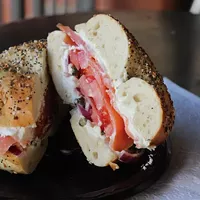
Eat This: Poppy’s Bagel with Lox and Cream Cheese
May 21, 2015 -

The Big Reveal: What's replacing the Penguin?
Apr 8, 2015 -
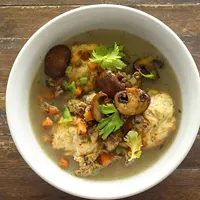
Eat this: ‘Chicken’ and Dumplings at Fern
Apr 1, 2015 - More »
Latest in Food & Drink Features
More by Keia Mastrianni
-

Eat this: Korean Fried Chicken at Kindred Restaurant
Aug 19, 2015 -
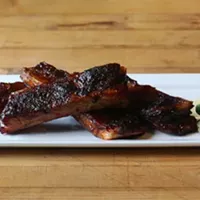
Eat This: Border springs lamb ribs at Bonterra
Jun 23, 2015 -

The Big Reveal: What's replacing the Penguin?
Apr 8, 2015 - More »
Calendar
-

Free Wine Tasting at Roots Cafe @ ROOTS Cafe
- Thu., Aug. 28, 4:30-6:30 p.m.
-

Armored Car Brewing Food Truck Friday @ Armored Cow Brewing
-

Trap & Paint (Hookah Edition) @ Blush CLT
-

Labor Day All White Extravaganza @ Blush CLT
-

University Farmers Market @ The Shoppes at University Place
-
Eat This: Poppy’s Bagel with Lox and Cream Cheese
-
Checking in at Heist Brewery 1
NoDa brewpub offers good variety in its libations
-
Recipe: Pineapple-Oxtail Marmalade Tarts
It's marmalade. With meat in it. In a cookie. This is a trust-me moment, readers.

